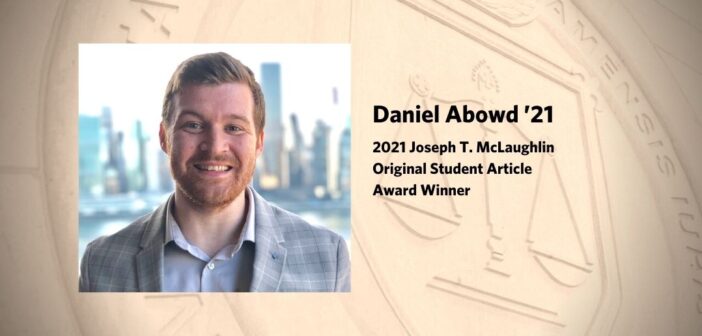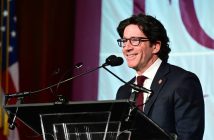Daniel Abowd ’21 was awarded the 2021 Joseph T. McLaughlin Original Student Article Award at the International Institute for Conflict Prevention and Resolution (CPR)’s 39th Annual Awards. The awards honor outstanding scholarship and practical achievement in the field of alternative dispute resolution. Abowd’s winning article is titled “Imagine: Could Mediation Systems Fix Songwriter Split Disputes?”
The award criteria focuses on processes, techniques, systems, commitment, and scholarship that address the resolution, prevention, or creative management of major disputes involving public or business institutions between corporations, between government and corporations, or among multiple parties. The review committee is composed of judges and lawyers from leading corporations, top law firms, and academic institutions across the country.
“Our core purpose at CPR is to engage thought leaders from all facets of the field—academics, students and practitioners—to develop innovative tools in service of dispute prevention and resolution,” said CPR President and CEO Allen Waxman in a statement on March 2. “The outstanding work awarded today is key to sustaining that purpose.”
The Inspiration for Abowd’s Article, “Imagine”
The winning article, written by Abowd while participating in Fordham Law’s Mediation Clinic last year, explores songwriter disputes and what Abowd calls the “wild west” process for allocating songwriter credit.
“There are really no rules, and as creative practices have evolved and the average number of writers per song has exploded, even the old norms and guideposts have become far less prominent,” said Abowd. He explained that splits can be divided evenly, unevely, by type of contribution (e.g. lyrics, melody, production, or arrangement), or by extent of contribution. “These aren’t necessarily all bad trends in a vacuum, but they’ve led to challenges—particularly for less established songwriters, songwriters who aren’t also recording artists, and other songwriters with built-in negotiating disadvantages.
Songwriting relationships, as Abowd explained, are also simultaneously personal, creative, emotional, and professional. “The whole process … can make negotiating awkward,” he continued, “[as you’re]caught at the crossroads of all those different dynamics inherent to all those different types of relationships.”
Abowd argues that because of the convoluted dynamics at play in songwriter relationships, and due to the lack of dispute mechanisms available to resolve songwriter disputes, songwriters are often forced to acquiesce to whatever split the more powerful counterpart deigns to give them—“even if they think it may not really be reflective of their contribution to the song.”
“I saw this firsthand, working in music publishing for a company that represented songwriters [The Royalty Network] for eight years before and during my time at Fordham Law,” Abowd said. “I found these dynamics consistently frustrating.”
As Abowd learned more about mediation and the advantages it offers relative to litigation and other dispute processes, and discovered that not very much had been written about split negotiations and the disputes themselves, he decided to author a paper of his own.
Music to His Ears
Prior to being recognized by the CPR Institute, Abowd’s article was honored by Harvard Negotiation Law Review last year as “best student note” in its 2020–21 Student Note Competition. It will be published in Harvard Negotiation Law Review‘s forthcoming Fall 2021 edition.
“When people you look up to and institutions you respect single your work out for recognition, it’s very validating,” Abowd said, noting that he often bounced between feelings of confidence and doubt while waiting to hear back from the groups he submitted the article to. “I’ve had a lot of support from my family and from Fordham Law, its faculty, and its community, which is the only reason I’m in a position to receive any accolades to begin with.”
Abowd is currently halfway through his first of two judicial law clerkships. This year, he is clerking at the U.S. District Court for the Southern District of New York. Next year, he’ll be clerking at the U.S. Court of Appeals for the Second Circuit.
He said he intends to eventually return to the world of intellectual property, copyright, and entertainment law as a litigator.
“Working in the judiciary, incidentally, has given me a whole new perspective on mediation, which plays a role in a lot of federal litigation,” Abowd said. “It’s been very interesting to hear different parties’ perspectives on whether and where they think mediation would be helpful.”
“There are certainly still a range of views out there,” he said. “Needless to say, many diverge significantly from the views expressed in my article.”




